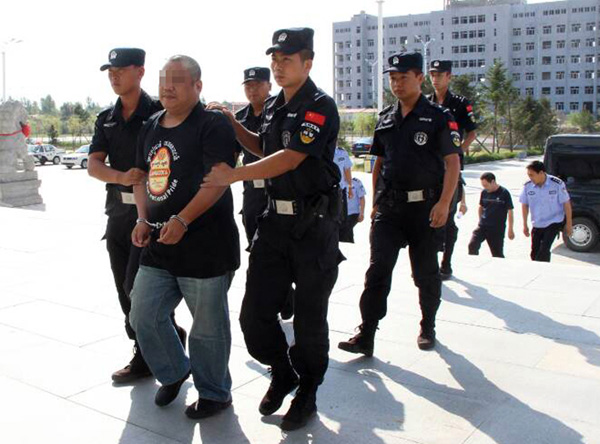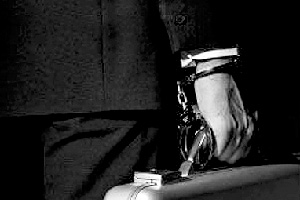Fugitive ends life on the lam
By Zhang Yan (China Daily) Updated: 2014-09-22 07:14
 |
|
A suspect surnamed Duan is repatriated on Aug 30. CHINA DAILY |
"The police in China face practical difficulties repatriating fugitives once they've escaped overseas, either because China has not signed extradition treaties with countries, such as the US and Canada, or because of lengthy or complex legal procedures," Liao Jinrong, director of the ministry's International Cooperation Department, said.
|
Undercover police unit part of 'fox hunt' It is common knowledge that a number of government agencies and banking institutions are located on Financial Street in Beijing, but few people realize that an undercover police unit, called the Fox-hunt special action team, operates out of one of the tall buildings that line the thoroughfare. The unit targets economic fugitives, including corrupt officials who flee overseas taking illicit assets with them. In July, the Ministry of Public Security initiated a five-month-long operation, code named "Fox Hunt 2014", to investigate and arrest fugitive officials, employing the services of the special unit that comprises experienced police officers from the Economic Crimes Investigation Bureau and local public security departments. "The average age of the team members is 30, but most of them have received higher education, including doctorates in economics and masters in law. Some of them graduated from prestigious UK universities," Liu Dong, deputy director of the bureau, said. "Many economic fugitives are highly intelligent and have also undertaken higher education, so we deploy officers with doctorates to nab these 'PhD fugitives'," he said. A large map hangs on the wall of the team's office. It is covered with red marks, each of them indicating the hiding places of "crafty foxes", as the corrupt, errant officials are known. A board next to the map records the number of captured suspects, each one carefully logged by the local public security organs, and is updated regularly. "The office is like the command center of a battlefield, we-the brave hunters-constantly intensify our efforts to crack down on and apprehend the crafty foxes," Liu Jinguo, vice-minister of Public Security, said. He said the officers are busy day and night collecting intelligence and cooperating with Interpol and other counterparts from other countries to bring these "economic fugitives" to justice. Until know, 88 economic fugitives, including several corrupt officials, have been repatriated. |
Liu Dong said that even if the Chinese police do detain fugitives overseas, it does not mean the process of extradition will be easy.
"We should submit solid extradition evidence and documents to the judiciaries of the relevant countries," he said. "If the evidence is inaccurate or unclear, it will lead to a failure to repatriate suspects."
Statistics from the Ministry of Foreign Affairs show that China has signed extradition treaties with 40 countries and regions, including Russia, Italy, Spain and South Korea, and has also signed mutual legal assistance treaties with 49 countries and regions, including France, Japan and Thailand.
Liu said that despite several obstacles, improvements in bilateral cooperation on law enforcement between China and the US have been made.
Judicial officials from both sides will meet in August or September every year to discuss major concerns, and the ministry is attempting to set up an annual high-level meeting with the US Department of Homeland Security to exchange intelligence with the view to repatriating criminals and recovering illegal assets, according to Wang Gang, a senior official at the ministry's International Cooperation Bureau.
Since the special action was initiated, the two sides have established agreements and achieved breakthroughs. "If solid evidence is obtained, the US police will detain suspects and freeze their bank accounts and real estate there."
Judicial cooperation
In addition, China is strengthening judicial cooperation with a number of other countries, including those in Latin America, Africa, Eastern Europe, as well as Pacific Island nations, to prevent them from becoming new havens for fugitives.
"The key is to set up a preventative mechanism to quickly identify signs of criminality and prevent corrupt officials from fleeing to foreign countries," Dai Peng, director of the Criminal Investigation Department at the People's Public Security University of China, said.
"As such, government officers above county level should regularly disclose their individual assets, while at the same time the financial and banking supervisors should diligently perform their duties to uncover suspicious money transfers to corrupt officials' overseas bank accounts," he said.
Dai also suggested that China should sign agreements related to the recovery of illegal assets with the relevant countries and push forward laws to curb excessive flows of funds to overseas countries, and to recover as much money as possible if it is moved overseas illegally.
Contact the author at zhangyan1@chinadaily.com.cn
 |
 |
- Govt encourages people to work 4.5 days a week
- Action to be taken as HIV cases among students rise
- Debate grows over reproductive rights
- Country's first bishop ordained in 3 years
- China builds Tibetan Buddhism academy in Chengdu
- Authorities require reporting of HIV infections at schools
- Typhoon Soudelor kills 14 in East China
- Police crack down on overseas gambling site
- Debate over death penalty for child traffickers goes on
- Beijing to tighten mail security for war anniversary







